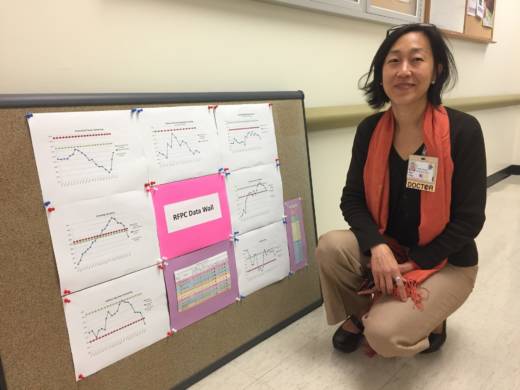"We are deeply troubled by the CBO's finding that the amount of support provided for consumers to buy health insurance in 2020, under proposed legislation would be only 60 percent of what is provided under current law," Lee said in a press release.
Before the Affordable Care Act, 40 percent of patients at Zuckerberg San Francisco General were uninsured. Now it's down to 3 percent, according to hospital CEO Susan Ehrlich.
Many of the people who now have coverage are similar to the young woman who wrote the letter to Chen: They got insurance through the Affordable Care Act's expansion of Medi-Cal to 3.7 million additional Californians. The Republican bill jeopardizes that funding.
"There’s a whole invisible group of people out there who really want insurance, want to pay their dues, but can’t afford it unless we structure the system right," Chen said.
Federico Reyes is a good example. He's a regular patient at Chen's clinic at the hospital. Among other things, he goes there to manage health issues related to having a leg amputated years ago.
When he lost his leg, Reyes was uninsured. He had necrotizing fasciitis, a bacterial infection that spreads quickly and kills the body's soft tissue. He said he went to another hospital but didn't receive adequate treatment because he lacked insurance. He later ended up in the emergency room at Zuckerberg S.F. General, where they amputated the leg. To this day, Reyes believes that if he had been covered at the time, the outcome of his infection would have been different.
Reyes is concerned about the Republican health bill, called the American Health Care Act (AHCA). He fears it will leave members of his community without proper health insurance.
"All the people that got health care —and I'm speaking mostly for us poor people — it's like taking the carpet right from under our feet," he said. "You hand us a piece of meat, and then you take it away from us."
Beyond concerns for patients, hospital staff members are worried about funding. Provisions of the Affordable Care Act added $125 million in revenue to the annual budget of the hospital and an affiliated network of neighborhood clinics.
"If Medi-Cal expansion is capped, then some of our patients will not be insured," said nurse Philippa Doyle. Medi-Cal expansion provided coverage for more Californians than those traditionally included in the Medi-Cal pool. "Because we treat everybody, then our reimbursement will go down significantly, and we won’t be able to provide resources that we are currently."
For Doyle, "resources" are not an abstraction. That money pays for more nurses, medical assistants and clerks to help with work flow.
Under the AHCA, public hospitals like San Francisco General are expected to lose tens of millions of dollars in government support every year.
